Unit 3 lesson3一轮复习学案
2022届新教材高考英语一轮复习必修第三册Unit3DiverseCultures学案含解析新人教版
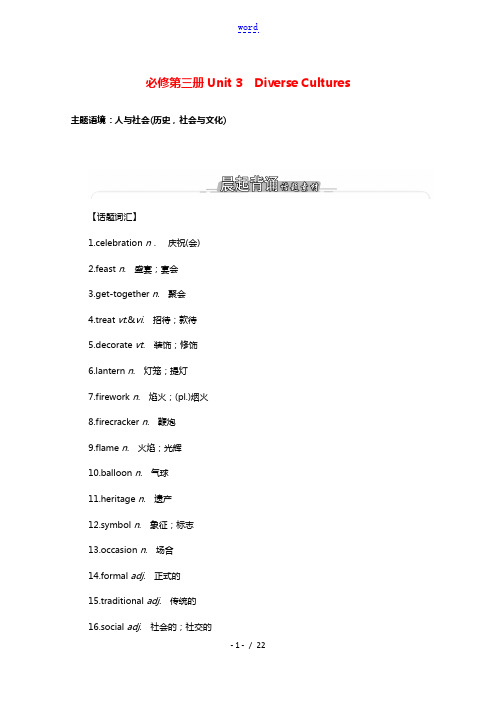
必修第三册Unit 3 Diverse Cultures 主题语境:人与社会(历史,社会与文化)【话题词汇】1.celebration n.庆祝(会)2.feast n. 盛宴;宴会3.gettogether n. 聚会4.treat vt.&vi. 招待;款待5.decorate vt. 装饰;修饰ntern n. 灯笼;提灯7.firework n. 焰火;(pl.)烟火8.firecracker n. 鞭炮9.flame n. 火焰;光辉10.balloon n. 气球11.heritage n. 遗产12.symbol n. 象征;标志13.occasion n. 场合14.formal adj. 正式的15.traditional adj. 传统的16.social adj. 社会的;社交的【话题短语】1.celebrate the festival 庆祝节日2.on special occasions 在特殊场合3.a display of fireworks 烟火表演4.cultural exchange 文化交流5.cultural background 文化背景6.cultural shock 文化冲击7.crosscultural munication 跨文化交流8.multicultural society 多元文化社会9.cultural diversity 文化多样性10.cultural conflict 文化冲突【话题佳句】1.Built in the 16th century, the castle has witnessed too much ing and going in history.建于16世纪,这座城堡见证了太多的历史沉浮。
2.Wellknown for its extraordinary quality, beautiful design and brilliant color, Chinese silk has been regarded as a symbol of Chinese culture.中国丝绸因非凡的质量、美丽的设计和色泽,已被认为是中国文化的象征。
2020届一轮复习人教版必修三Unit 3The Million Pound Bank Note学案

必修3Unit 3The Million Pound Bank Note1scene n.(戏剧)一场;现场;场面;景色;(电影,电视的)一个镜头;(事件发生的)地点Act Ⅰ,Scene 3(教材P17)第一幕,第三场(1)⎩⎪⎨⎪⎧on the scene 在场;当场;到场;出现appear/come on the scene 出场;登场 (2)behind the scenes 在幕后;暗中【比较网站】Nine people died on the scene and one more person died in hospital in the car crash.撞车事故中有9人当场死亡,还有一人在医院里死亡。
②On receiving the call, the police rushed to the scene, where a traffic accident happened. 警方一接到报警电话就火速赶到了现场,那里发生了一场交通事故。
③The beautiful scenery inspired the composer.美丽的景致激发了这位作曲家的创作(灵感)。
④This room has a beautiful view, and you can see a park from the window.这个房间的景观不错,从窗户望过去,你能看到一个公园。
⑤The practice of hanging clothes across the street is a common sight in many parts of the city.在该市的许多地区,在大街上晾晒衣服是很常见的景象。
⑥We'd toured the sights of Paris.我们已游览了巴黎的名胜。
2permit v .允许;容许;许可n .许可证;执照;通行证Permit me to lead the way, sir.(教材P 18)先生,请让我来带路吧。
师大选必U3ConservationLesson3The road to destruction教案
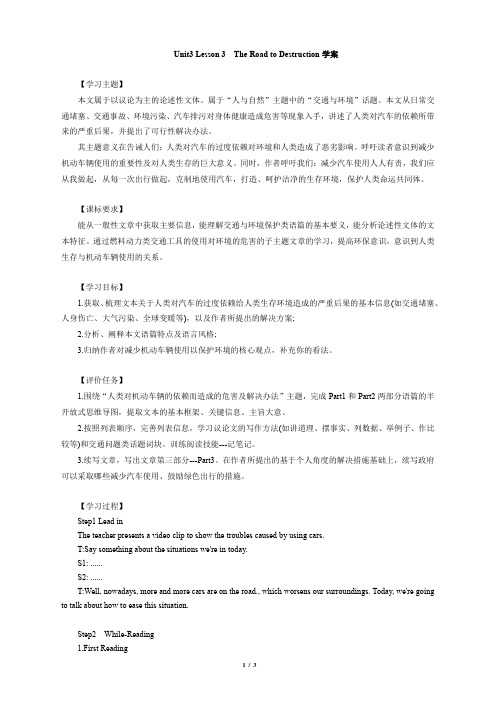
Unit3 Lesson 3 The Road to Destruction学案【学习主题】本文属于以议论为主的论述性文体。
属于“人与自然”主题中的“交通与环境”话题。
本文从日常交通堵塞、交通事故、环境污染、汽车排污对身体健康造成危害等现象入手,讲述了人类对汽车的依赖所带来的严重后果,并提出了可行性解决办法。
其主题意义在告诫人们:人类对汽车的过度依赖对环境和人类造成了恶劣影响。
呼吁读者意识到减少机动车辆使用的重要性及对人类生存的巨大意义。
同时,作者呼吁我们:减少汽车使用人人有责,我们应从我做起,从每一次出行做起,克制地使用汽车,打造、呵护洁净的生存环境,保护人类命运共同体。
【课标要求】能从一般性文章中获取主要信息,能理解交通与环境保护类语篇的基本要义,能分析论述性文体的文本特征。
通过燃料动力类交通工具的使用对环境的危害的子主题文章的学习,提高环保意识,意识到人类生存与机动车辆使用的关系。
【学习目标】1.获取、梳理文本关于人类对汽车的过度依赖给人类生存环境造成的严重后果的基本信息(如交通堵塞、人身伤亡、大气污染、全球变暖等),以及作者所提出的解决方案;2.分析、阐释本文语篇特点及语言风格;3.归纳作者对减少机动车辆使用以保护环境的核心观点,补充你的看法。
【评价任务】1.围绕“人类对机动车辆的依赖而造成的危害及解决办法”主题,完成Part1和Part2两部分语篇的半开放式思维导图,提取文本的基本框架、关键信息、主旨大意。
2.按照列表顺序,完善列表信息,学习议论文的写作方法(如讲道理、摆事实、列数据、举例子、作比较等)和交通问题类话题词块。
训练阅读技能---记笔记。
3.续写文章,写出文章第三部分---Part3。
在作者所提出的基于个人角度的解决措施基础上,续写政府可以采取哪些减少汽车使用、鼓励绿色出行的措施。
【学习过程】Step1 Lead inThe teacher presents a video clip to show the troubles caused by using cars.T:Say something about the situations we're in today.S1: ......S2: ......T:Well, nowadays, more and more cars are on the road., which worsens our surroundings. Today, we're going to talk about how to ease this situation.Step2 While-Reading1.First Reading※Read Part 1 of the text and draw up a mind map, which includes a note you make for the FIGURES.2.Second ReadingPair work1)※Read Part 2 of the text and complete the half-open mind map in Exercise 3 at Page 54 to extract the basic structure and key information of the article.2)Read the words and expressions in the following Word Bank on Extinction.species n.物种dinosaur n.恐龙survive v.存活oxygen content氧气含量volcanic eruption火山喷发global warming全球变暖is cause for concern让人担忧natural causes自然原因die out灭绝;消失wipe out消灭;灭绝mass extinction大灭绝;大毁灭endangered species濒危物种solar energy太阳能off the coast海岸附近的lay eggs下蛋restore habitats修复栖息地take action to do sth.采取行动做某事take steps to do sth.采取措施做某事take measures to do sth.采取措施做某事What is the writing style?A.An exposition.(说明文)B.An argumentation.(议论文)C.An narrative.(记叙文)D.A practical essay.(应用文)2.Third ReadingPair work1)What ways of argument does the writer use to convince readers?Scan the news report and discuss some typical features of an exposition.◎giving definitions(下定义)◎presenting facts(摆事实)◎citing ideas(引观点)◎giving examples(举例子)◎using data(列数据)◎making assumptions(作假设)◎analyzing cause and effect(分析因果关系)2)What typical grammar is used in the article? Explore the sentences with the grammar. Why does the author use it so frequently?Example:◎Extinctions, where entire species are wiped out, are not unusual in our Earth's history.◎◎◎◎◎.........3.Third ReadingSolo workContinue to write the last paragraph, making more suggestions on avoiding the sixth extinction by using as many relative clauses as possible.Step3 Post-readingPair workRead through the Case Study called The Black Robin and draw a conclusion from the case.阅读教材53面上的题目为《黑色知更鸟》的生态保护类案例研究小短文,并从中总结出物种保护的观点或有效做法。
Unit3Conservationlesson3复习导学案高考英语一轮复习北师大版选择性
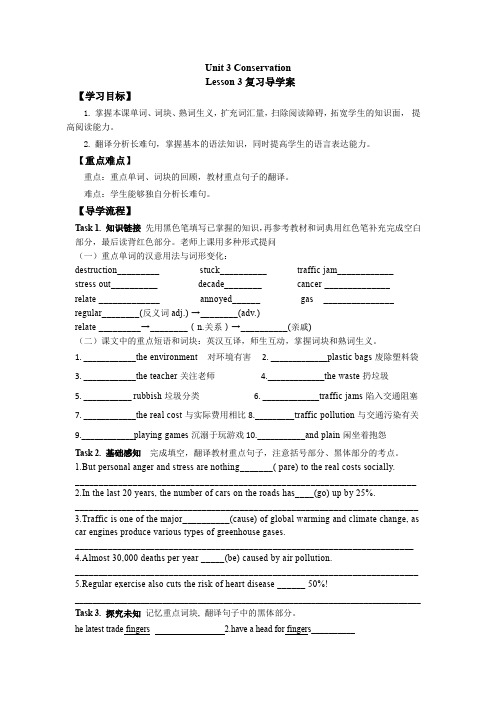
Unit 3 Conservation Lesson 3复习导学案 【学习目标】 1. 掌握本课单词、词块、熟词生义,扩充词汇量,扫除阅读障碍,拓宽学生的知识面, 提高阅读能力。
2. 翻译分析长难句,掌握基本的语法知识,同时提高学生的语言表达能力。
【重点难点】 重点:重点单词、词块的回顾,教材重点句子的翻译。
难点:学生能够独自分析长难句。
【导学流程】 Task 1. 知识链接 先用黑色笔填写已掌握的知识,再参考教材和词典用红色笔补充完成空白部分,最后读背红色部分。
老师上课用多种形式提问 (一)重点单词的汉意用法与词形变化: destruction_________ stuck__________ traffic jam____________ stress out__________ decade________ cancer ______________ relate _____________ annoyed______ gas _______________regular________(反义词adj.) →________(adv.) relate _________→________(n.关系)→__________(亲戚) (二)课文中的重点短语和词块:英汉互译,师生互动,掌握词块和熟词生义。
1. ____________the environment 对环境有害 2. _____________plastic bags 废除塑料袋 3. ____________the teacher 关注老师 4._____________the waste 扔垃圾5. ___________ rubbish 垃圾分类6. _____________traffic jams 陷入交通阻塞7. ____________the real cost 与实际费用相比 8._________traffic pollution 与交通污染有关9.____________playing games 沉溺于玩游戏 10.___________and plain 闲坐着抱怨Task 2. 基础感知 完成填空,翻译教材重点句子,注意括号部分、黑体部分的考点。
仁爱英语七年级Unit 3 Topic 3 复习学案

Unit 3 Topic 3 复习精练你自己________________________ 晚餐,正餐____________________ 打算,想要,将会_________________ 食物_________________________ 鱼肉,鱼,钓鱼________________ 可以,可能___________________ 鸡肉,鸡______________________ 拿,乘坐,花费,服用,携带_______ 米,米饭,稻米_________________ 点菜,命令,顺序_____________ 喝,饮料_______________________ 先生_________________________ 果汁__________________________ 某物,某事__________________ 牛奶__________________________ (玻璃)杯_____________________ 主意___________________________ 嗯__________________________ 水____________________________ 吃__________________________ 蔬菜___________________________ 在(到)外面__________________ 面包___________________________ 为什么______________________ 汉堡包_________________________ 亲爱的,昂贵的_______________ 通常地_________________________ 友好的,种,类________________ 早餐___________________________ 可爱的;机灵的_______________ 午餐___________________________ 在,是_______________________请随便吃/喝_____________ 想要_____________ all right________________一杯橙汁________________ 好主意____________ what about…?__________ ( ) 1. ---Would you like _____milk? ---Yes, please.A. aB. someC. any( ) 2. Kangkang would like a ________.A. breadB. hamburgerC. rice( ) 3. ---What would you like to ______? --- Some fish, please.A. eatB. drinkC. go( ) 4. ---__________? --- No, thanks.A.Would you like some waterB.What do you likeC.What would you like to drink( ) 5. We’d like __________.A.two glasses of watersB. two glass of waterC. two glasses of water ( ) 6. I’d like _____egg and ______chicken.A. some; aB. some; someC. an; some7.句型转换:I’d like some eggs. (改为一般疑问句)______ you ______ some eggs?8. 用适当形式填空。
2020届一轮复习人教版必修三Unit 3The Million Pound Bank Note单元学案设计(15页word版)
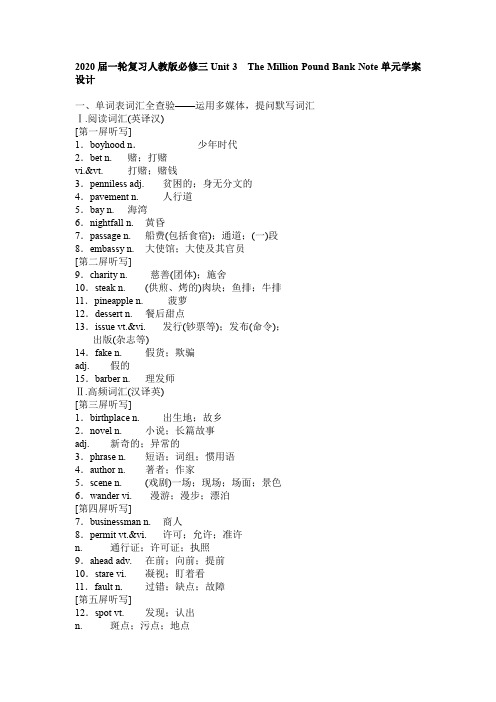
2020届一轮复习人教版必修三Unit 3The Million Pound Bank Note单元学案设计一、单词表词汇全查验——运用多媒体,提问默写词汇Ⅰ.阅读词汇(英译汉)[第一屏听写]1.boyhood n.少年时代2.bet n. 赌;打赌vi.&vt. 打赌;赌钱3.penniless adj. 贫困的;身无分文的4.pavement n. 人行道5.bay n. 海湾6.nightfall n. 黄昏7.passage n. 船费(包括食宿);通道;(一)段8.embassy n. 大使馆;大使及其官员[第二屏听写]9.charity n. 慈善(团体);施舍10.steak n. (供煎、烤的)肉块;鱼排;牛排11.pineapple n. 菠萝12.dessert n. 餐后甜点13.issue vt.&vi. 发行(钞票等);发布(命令);出版(杂志等)14.fake n. 假货;欺骗adj. 假的15.barber n. 理发师Ⅱ.高频词汇(汉译英)[第三屏听写]1.birthplace n. 出生地;故乡2.novel n. 小说;长篇故事adj. 新奇的;异常的3.phrase n. 短语;词组;惯用语4.author n. 著者;作家5.scene n. (戏剧)一场;现场;场面;景色6.wander vi. 漫游;漫步;漂泊[第四屏听写]7.businessman n. 商人8.permit vt.&vi. 许可;允许;准许n. 通行证;许可证;执照9.ahead adv. 在前;向前;提前10.stare vi. 凝视;盯着看11.fault n. 过错;缺点;故障[第五屏听写]12.spot vt. 发现;认出n. 斑点;污点;地点13.account vi.&vt. 认为;说明;总计有n. 说明;理由;计算;账目14.seek vt.&vi. 寻找;探索;寻求15.patience n. 耐性;忍耐16.contrary n. 反面;对立面adj. 相反的;相违的[第六屏听写]17.envelope n. 信封18.unbelievable adj. 难以置信的19.amount n. 数量20.rude adj. 粗鲁的;无礼的21.manner n. 礼貌;举止;方式22.scream vi. 尖声叫n. 尖叫声;喊叫声[第七屏听写]23.genuine adj. 真的;真诚的24.rag n. 破布;碎布25.indeed adv. 真正地;确实;实在26.bow vi.& n. 鞠躬;弯腰27.adventure n. 奇遇;冒险28.bring_up 抚养;培养;教育;提出;呕吐29.make_a_bet 打赌[第八屏听写]30.go_ahead 前进;(用于祈使句)可以;往下说31.by_accident 偶然;无意中;不小心32.stare_at 盯着看;凝视33.account_for 是……的原因;解释34.on_the_contrary 与此相反;正相反35.take_a_chance 冒险36.in_rags 衣衫褴褛37.as_for 关于;至于二、单元核心考点初热身——提供语境,单元考点自测回顾(一)分类识记单词——用时少•功效高识记单词写对Ⅰ.知其意(英译汉)1.pavement n. 人行道2.passage n. 船费(包括食宿);通道;(一)段3.embassy n. 大使馆;大使及其官员4.charity n. 慈善(团体);施舍5.dessert n. 餐后甜点6.barber n. 理发师Ⅱ.写其形(汉译英)1.phrase n. 短语;词组;惯用语2.author n. 著者;作家3.ahead adv. 在前;向前;提前n. 斑点;污点;地点4.spot vt.发现;认出5.envelope n. 信封6.amount n. 数量7.scream vi. 尖声叫n. 尖叫声;喊叫声8.indeed adv. 真正地;确实;实在核心单词练通 1.The boys wandered (徘徊) around the town with nothing to do.2.Why should I say sorry when it's not my fault (过错)?3.The girl is staring (盯着看) at the stranger with her eyes wide open.4.Would you like to enjoy the scenes (景色) in the mountains with me?5.The reason he gave to account (说明) for his absence was unbelievable.6.I am interested in western culture, and love reading English novels (小说).7.They are seeking (寻找) the most reasonable diet which will do good to their health.8.Generally speaking, good manners (举止) arise from respect for others.9.My sister's taste in dresses is contrary (相反的) to my own.拓展单词用活[记全记牢]1.adventure n.奇遇;冒险→adventurous adj.冒险的2.permit vt.&vi.许可;允许;准许n.通行证;许可证;执照→permission n.许可3.patience n.耐性;忍耐→patient adj.忍耐的;耐心的n.病人→patiently adv.耐心地4.unbelievable adj.难以置信的→believable adj.可信的→believe v.相信;信任→belief n.信念;信仰5.rude adj.粗鲁的;无礼的→rudeness n.粗鲁[用准用活]1.You were so rude to him that you must offer him an apology for your rudeness last night.(rude)2.Although the patient was out of patience,_the nurse was still patient with her work and did it patiently.(patience)3.In our school, the students are not permitted to use phones and without permission they can't leave school during weekdays.(permit)4.He is the most believable person, but on the other hand, how unbelievable it is that he should believe in the liar.(believe)⇩积得多平时多输入,用时顺手出1.“真正;确实”家族①indeed adv.真正地;确实;实在②real adj. 真实的;现实的③true adj. 真实的;真正的④sincere adj. (指感情或行为)真实的;诚挚的2.“过失”与“冲突”相关词一览①fault n.过错②argument n. 争吵;争论③quarrel n. 争吵;吵架④conflict n. 冲突 3.以-ssion结尾的名词集锦①permission许可②discussion 讨论③possession 拥有④expression 表情⑤impression 印象(二)语段串记短语——不枯燥•兴趣高先写对再用准第一组1.bring_up抚养;培养;教育;提出;呕吐2.account_for 是……的原因;解释3.a_large_amount_of 许多;大量4.take_a_chance 冒险5.in_rags 衣衫褴褛6.make_a_bet 打赌7.on_the_scene_ 在现场Mark Twain was ①brought_up in Missouri in the middle part of the United States. When he grew up, he ②took_a_chance to work as a pilot on a river ter, he decided to become a writer, which helped him make ③a_large_amount_of money. Many of Mark Twain's novels have been translated into other languages, which ④accounts_for the reason why he and his works are deeply loved by readers throughout the world.第二组1.go_ahead前进;(用于祈使句)可以;往下说2.as_for 关于;至于3.from_the_bottom_of_one's_heart发自内心4.find_fault_with 吹毛求疵;找毛病5.stare_at 盯着看;凝视6.on_the_contrary 与此相反;正相反7.by_accident 偶然;无意中;不小心I got so fed up with waiting for him to do it that I just ①went_ahead and did it myself. ②As_for me, it was how to do it in a short time that was of great importance. To tell the truth, I didn't like him ③from_the_bottom_of_my_heart as he liked ④finding_fault_with others who talked with him on the spot.⇩积得多平时多输入,用时顺手出1.“take a(n)+n.”一览①take a chance冒险②take a break休息一下③take a seat 就坐④take a shower 淋浴;洗澡⑤take an exam 参加考试⑥take an example 举例;示范⑦take a nap 小睡一会儿⑧take a photo 拍照2.“v.+for”高频短语聚焦①account for 解释;占(比例) ②apply for申请③call for 要求;需要④care for 喜欢⑤answer for 负责⑥arrange for 安排⑦leave for 出发去⑧hope for 希望;期望(三)仿写用活句式——造佳句•表达高背原句明句式学仿写1.Well, towards nightfall I found myself carried out to sea by a strong wind.嗯,傍晚时分我发现自己被一阵大风刮到海上去了。
人教版高中英语必修3一轮复习精品学案新课标 Unit3 The Million Pound Bank Note

Unit3The Million Pound Bank Note1、permit v.&n.根据语境猜词义(1) We don't permit middle school students to surf the Internet to play computer games.(2) Hurry up! Our teacher permitted us only twenty minutes to finish the work.根据语义找匹配:A. 允许 B. 准许(1) A(2) Bpermit vt. 允许,许可n. 通行证;许可证;执照permission n. 允许;准许permit sb. to do sth. 允许某人做某事permit doing sth. 允许做某事permit of许可;准许ask for permission 请求允许with/without one's permission在某人的准许下/没获得某人的允许allow/permitallow所表示的“允许”通常含有听任、默许、个人不加阻止之意;The students in this school are not allowed to surf the Internet in the Net bar.permit含有(文件、上级规定)的“允许”,带有客观意味,语气较强。
The nurse allowed him to stay there, though it was not permitted.(1)permit 作为动词和作为名词时的发音不同。
(2)作为名词的permit与permission的语义不同。
(3)注意allow, permit, forbid和advise所构成的基本句式是相同的。
以allow为例:sb. sth.doing sth.+形容词性物主代词(one's) +doing sth.+宾格代词(如him)+to do sth.sb. is allowed to do sth.allow完成句子(1)除非你有许可证,未经允许不能在此处停车。
人教版高中英语必修3高考一轮复习学案人教版必修三Unit 3 The Million Pound BankNote

必修③Unit 3Ⅰ.单词拼写1.You must get a ________ (许可证) if you want to keep a gun.答案:permit2.He ________ (认出) his friend in the crowd.答案:spotted3.When did you make your first ________ (露面) on the stage?答案:appearance4.We listened to her story in an interesting ________ (方式).答案:manner5.After three hours of waiting for the train,our ________ (耐心) finally went to end.答案:patience6.Don't be too ________ (粗鲁的) to your friends.You should be friendly to each other.答案:rude7.The fans ________ (尖叫) with excitement when they saw the star.答案:screamed8.All the children listened to his ________ (冒险) with eager attention.答案:adventure9.It was really ________ (难以置信的) that he fell off the truck without being hurt.答案:unbelievable10.He opened the ________ (信封) and took out the letter from my parents.答案:envelopeⅡ.完成句子1.Though he was told it was hard to find a job there,he still decided to __________ __________ __________尽管有人告诉他在那儿找工作很难,但他还是决定冒一下险。
unit 3 lesson 3 wonders of the world 学案(含答案)
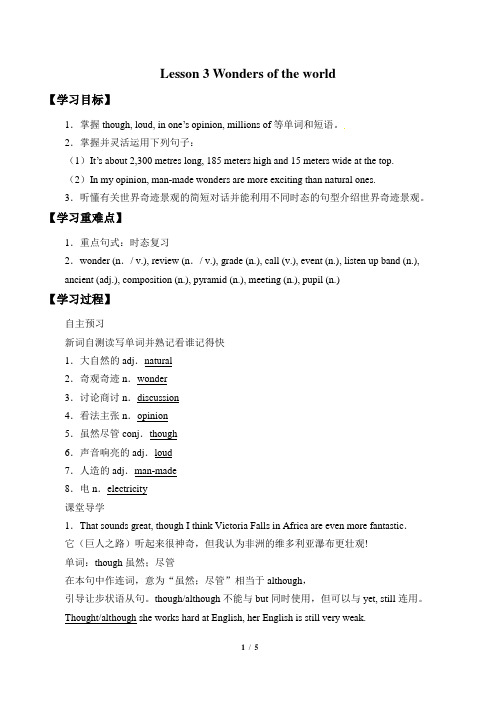
Lesson 3 Wonders of the world【学习目标】1.掌握though, loud, in one’s opinion, millions of等单词和短语。
2.掌握并灵活运用下列句子:(1)It’s about 2,300 metres long, 185 meters high and 15 meters wide at the top.(2)In my opinion, man-made wonders are more exciting than natural ones.3.听懂有关世界奇迹景观的简短对话并能利用不同时态的句型介绍世界奇迹景观。
【学习重难点】1.重点句式:时态复习2.wonder (n./ v.), review (n./ v.), grade (n.), call (v.), event (n.), listen up band (n.), ancient (adj.), composition (n.), pyramid (n.), meeting (n.), pupil (n.)【学习过程】自主预习新词自测读写单词并熟记看谁记得快1.大自然的adj.natural2.奇观奇迹n.wonder3.讨论商讨n.discussion4.看法主张n.opinion5.虽然尽管conj.though6.声音响亮的adj.loud7.人造的adj.man-made8.电n.electricity课堂导学1.That sounds great, though I think Victoria Falls in Africa are even more fantastic.它(巨人之路)听起来很神奇,但我认为非洲的维多利亚瀑布更壮观!单词:though虽然;尽管在本句中作连词,意为“虽然;尽管”相当于although,引导让步状语从句。
though/although不能与but同时使用,但可以与yet, still连用。
高三英语第一轮复习教案(模块三第三单元)

Module 3 Unit 3新课标单词civilization n 文明lecture n 讲座volcano n 火山erupt vi (火山等)爆发ash n 火山灰;灰,灰烬rock n 岩石unfortunately adv 不幸地bury vt 埋,埋葬;安葬stone 石,石头director n 主管,负责人,主任mud n 泥,泥浆,烂泥body n 尸体destroy vt 破坏,摧毁house vt 收藏,储藏wealthy adj 富有的,富裕的commercial adj 商业的,贸易的gradually adv 逐步地,逐渐地sandstorm n 沙尘暴,风沙cultural adj 文化的institute n(教育,专业等的)机构,研究所Swedish adj 瑞典的,瑞典人的;瑞典语的ruin n (常作ruins)废墟,遗迹remains n 遗迹,遗址,残留物paint vt (用颜料等)画;油漆pot n 罐,壶material n 材料,物质document n 文献,文件temple n 庙,寺庙workshop n 车间;作坊enormous adj 巨大的,庞大的wise adj 明智的;高明的;英明的heat n 热,热度drive vt 迫使(某人生气,发疯等)passage n 通道,过道burial n 埋葬burial chamber 墓室bone n 骨,骨头wooden adj 木制的condition n 状态,状况,条件,情形uncover vt 发现,揭开(盖子)feed vt 为……提供食物,养活concerned adj 担心的,关心的citizen n 市民major adj 主要的carry out 实施,执行,实行airfield n 机场bomb vt 轰炸n 炸弹explode vi 爆炸board n 甲板,木版sink vi & vt (使)下沉,(使)沉浸airplane n 飞机president n 总统declare vt 宣布,宣告,宣称in memory of 纪念battleship n 战舰republic n 共和国,;共和政体confusion n 混乱,混淆fighting n 战斗;战争;打斗influence vt & n 影响emperor n 皇帝unite vt & vi 统一;联合;团结overthrow vt 推翻,颠覆poetry n 诗歌similarity n 相似点,相似,类似trade n 贸易,交易china n 陶瓷wool n 羊毛goods n 商品;货物no more 不复存有;不再formation n 形成reunite vt & vi 重新统一;再联合课文出现短语1. a historical event2. arrange for3. go on a cultural expedition to4. go to a lecture5. take over6. be buried alive7. on rainy days8. turn to9. be covered with10. be off to11. run through12. prevent …from13. agree with14. refer to15. pay attention to doing16. have the chance to do/of doing17. throughout the world18. be involved in19. brush away 20. be related to21. a huge success22. make a discovery23. go through24. be in good condition25. a concerned citizen26. focus on27. carry out28. set sail for29. less than30. on board31. in memory of32. in history33. be in use34. in return for一.单词应用根据单词的首字母或汉语意思填写准确单词,注意形式变化1.Both Pompeii and Loulan became lost ______________(文明) about 2,000 years ago.2. This morning we went to a ____________ (讲座)about Pompeii.3. Near the city was a volcano called Vesuvius. On 24th August AD 79, the volcano _________ (爆发)and lava, ash and rocks poured out of it onto the surrounding countryside.4. It continued to erupt for the next three days. _______________, (不幸的地)all the people were buried alive, and so was the city.5.So in 1860, the Italian archaeologist Giuseppe Fiorelli was made ___________ ( 负责人)of the Pompeii dig.6. Tomorrow we are off to Naples to visit the museum that __________(储藏)many of the treasures from Pompeii.7. It’s hard to imagine how this quiet volcano _____________ (毁坏)the whole city!8.This small, wealthy _______________ (商业的)city existed almost 2,000 years ago.9.An archaeologist from the local ______________ (文化的) institute, Professor Zhang told usthis.10. Sven found the ____________(废墟)of buildings buried under the sand, together with a lotof treasures, such as coins, painted pots, silk ______________,(材料)_____________ (文献)and wall paintings.11. The desert was once a green land with trees, but even that didn’t prevent the city from being_________ (埋葬)by sand--- what a pity!12. A saying goes ________ Rome wasn’t built in a day.13. During these years I have had the chance to explore many different places in China and______________ the world.14. We went through a 10-meter-long ____________ (通道)and we found ourselves in a largeburial chamber.15. We saw pieces of material, bones, _________ (木制的)cups and leather bags.16. Most of them were in good ____________.(状况)17.Jack is a concerned c__________(市民).18.Pear Harbor is one of the ___________ (主要的)military bases of the United States.19. The next day, US President Franklin Roosevelt ______________ (宣布)war against Japan.20. A national ___________ (纪念碑)was built in Pear Harbor just above the remains of the sunkbattleship Arizona.21. In 753 BC, the city of Rome was founded, and in 509 BC, it became a ____________.(公开)22. During the same period, there was much ___________ (混乱)and fighting between thegroups of people who ruled the different parts of China.23.There is another _____________ (相似点) between China and Rome.24.It was a different story for China with the _____________ (形成) of the Sui Dynasty in AD581, which once again ___________ (统一)China in AD 589.25.Fifteen years later the Qin Dynasty was ______________ (推翻).二.词形转换1. major adj. →__________(n.)2. wealthy adj.→__________(n.)3. commercial adj.→__________(n.)4. heat n.→_________(v.) →_________(adj.)5. unite v. →__________(adj.)6. concerned adj.______(n./v.______ (prep.)7. faithfully adv. _____(adj.) →______(n.) 8. condition n.→__________(adj.)9.cultural adj. →__________(n.) 10. explode vi. _______(n.) ________(adj.)三.用方框内所给短语的适当形式填空1) He opened the drawer and ______________ a notebook.2) He expects to ______________ the business when his father retires.3) Can you _________________what I am saying?4) Mr. Li __________________gardening after he retired.5) _________________ the notes while listening to the teacher.6) Who has___________________ my book?7) Who will ____________________ the class when the head-teacher is away?8) The Chinese government _____________________to protect the cultural heritage.四、句型结构1. The book had a great effect on his life. The book I _____________ his life greatly.2. They didn’t tell me the location. They didn’t show me the map, either.They ___________ told me the location ________ showed me the map.3. Some people tried to escape, some people stayed in their houses.People ___________ tried to escape _______ stayed in their houses.4. It worries the tourists. It keeps raining.______ ______ ________ _________ ________ the tourists.5.They also ________ ________ (进行)other experiments.6.When autumn comes, leaves (变成)________ ________ orange, red and gold.7.我们对他的健康表示关心。
高中英语 一轮复习学案 Unit3 必修三

一轮复习学案Unit3 必修三夯实基础:I. 单句填空1. ___________(fortunate), she locked herself out of the flat for leaving without keys this morning.2. For example, I have successfully got _____________ (admit) as a volunteer for the 13th National Games.3.He was unconscious and as I looked at his face, something ____________(occur) to me. Those brown eyes were very familiar.4. The scientist claimed ________________(invent) a new kind of car.5. If you associate with positive-thinking people, you are _______________(definite) going to achieve success.6. In my view, the problem can ________________(settle) in no time if you double your efforts.7. Large quantities of animals escaped ___________________(kill) in the big fire.8.He was so excited that he could hardly contain ______________(he).II. 完成句子1. 无论这个男孩多么频繁地被鼓励,他总是情绪低落。
(连词+分词)____________________________________ ,the boy was always in low spirits.2. 我突然想到,我还没完成作业。
2020届一轮复习人教版必修三Unit3The Million Pound Bank Note 单元教案(82页word版)
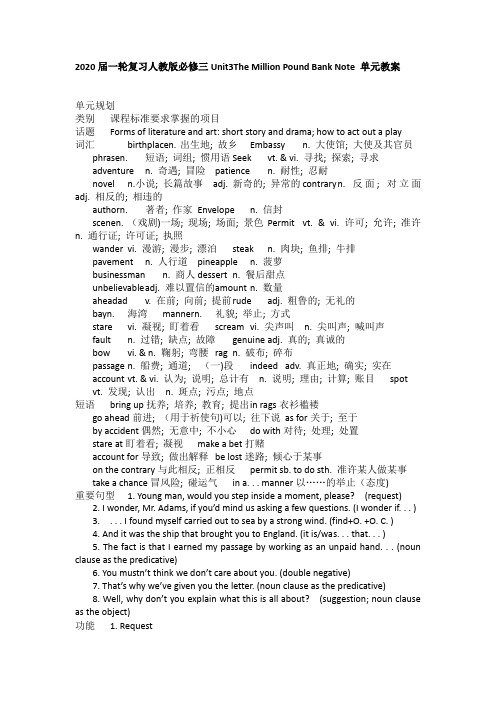
2020届一轮复习人教版必修三Unit3The Million Pound Bank Note 单元教案单元规划类别课程标准要求掌握的项目话题Forms of literature and art: short story and drama; how to act out a play词汇birthplacen. 出生地; 故乡Embassy n. 大使馆; 大使及其官员phrasen. 短语; 词组; 惯用语 Seek vt. & vi. 寻找; 探索; 寻求adventure n. 奇遇; 冒险patience n. 耐性; 忍耐novel n.小说; 长篇故事adj. 新奇的; 异常的 contrary n. 反面; 对立面adj. 相反的; 相违的authorn. 著者; 作家Envelope n. 信封scenen. (戏剧)一场; 现场; 场面; 景色Permit vt. & vi. 许可; 允许; 准许n. 通行证; 许可证; 执照wander vi. 漫游; 漫步; 漂泊steak n. 肉块; 鱼排; 牛排pavement n. 人行道pineapple n. 菠萝businessman n. 商人 dessert n. 餐后甜点unbelievable a dj. 难以置信的amount n. 数量aheadad v. 在前; 向前; 提前r ude adj. 粗鲁的; 无礼的bayn. 海湾mannern. 礼貌; 举止; 方式stare vi. 凝视; 盯着看scream vi. 尖声叫n. 尖叫声; 喊叫声fault n. 过错; 缺点; 故障genuine adj. 真的; 真诚的bow vi. & n. 鞠躬; 弯腰rag n. 破布; 碎布passage n. 船费; 通道; (一)段indeed adv. 真正地; 确实; 实在account vt. & vi. 认为; 说明; 总计有n. 说明; 理由; 计算; 账目spot vt. 发现; 认出n. 斑点; 污点; 地点短语bring up抚养; 培养; 教育; 提出i n rags衣衫褴褛go ahead前进; (用于祈使句)可以; 往下说as for关于; 至于by accident偶然; 无意中; 不小心do with对待; 处理; 处置stare at盯着看; 凝视make a bet打赌account for导致; 做出解释be lost迷路; 倾心于某事on the contrary与此相反; 正相反permit sb. to do sth. 准许某人做某事take a chance冒风险; 碰运气in a. . . manner以……的举止(态度)重要句型 1. Young man, would you step inside a moment, please? (request)2. I wonder, Mr. Adams, if you’d mind us asking a few questions. (I wonder if. . . )3. . . . I found myself carried out to sea by a strong wind. (find+O. +O. C. )4. And it was the ship that brought you to England. (it is/was. . . that. . . )5. The fact is that I earned my passage by working as an unpaid hand. . . (noun clause as the predicative)6. You mustn’t think we don’t care about you. (double negative)7. That’s why we’ve given you the letter. (noun clause as the p redicative)8. Well, why don’t you explain what this is all about? (suggestion; noun clause as the object)功能 1. RequestWould you please come in?Could you offer me some kind of work?Would you mind waiting just a few minutes?I wonder, Mr. Adams, if you mind us asking a few questions?May I ask you how much money you have?—Well, to be honest, I have none.—Go right ahead.2. Ordering foodI’d like some ham and eggs and a nice bi g steak.I’ll have a nice long glass of beer.3. Shopping语法 1. Noun clauses as the objectI can’t say that I have any plans.. . . and he does not know what he should do.I did not know whether I could survive until morning.2. Noun clauses as the predicativeThat’s why we’ve given you the letter.The fact is that I earned my passage by working as an unpaid hand. . .教学重点 1. Get students to know about forms of literature and art: short story and drama; how to act out a play.2. Have students learn some useful new words and expressions in this unit.3. Enable students to grasp and use the expressions of request and ordering food.4. Let students learn the new grammar item: noun clauses as the object and predicative.5. Develop students’ listening, speaking, reading and writing abilities.教学难点 1. Enable students to master the new grammar item: noun clauses as the object and predicative.2. Let students learn how to act out a play.3. Develop students’ integrative skills.课时安排Periods needed: 7Period 1 Warming up and readingPeriod 2 Learning about language: Important language pointsPeriod 3 Learn ing about language: GrammarPeriod 4 Using language: Reading, acting and speakingPeriod 5 Using language: Listening, writing and speakingPeriod 6 Using language: Listening, reading and writingPeriod 7 Revision: Summing up and learning tipPeriod 1Warming up and reading整体设计教材分析This is the first teaching period of this unit. At the beginning of the class, the teacher can lead in the topic of the unit by having a free talk with students about the background knowledge, talking about Mark Twain and his play.Mark Twain is probably one of the few American writers with whom students are already familiar. The Warming Up is intended to discover just how much students know about this 19th century writer and let those who don’t know ab out him know about him before they read the play. The teacher can use this part to introduce information that Chinese students should have.Exe rcise 1 in the Pre-reading provides students with an important choice. For some, knowing what they would do with the money is easy to decide. For others, it may pose a real dilemma, especially if they feel obligated to help others with the money. Whatever choice students make here, they should be ready to offer their classmates a good reason for it. Exercise 2 is to check whether students have read the story or have seen the film and for students to be ready for the next part Reading.The reading passage is a play which is adapted from Mark Twain’s short story by the same title. It briefly describes that Henry, a San Francisco businessman, is rescued at sea by a British ship that takes him to London where he finds himself without money, friends, or the prospect of a good job. Hungry and alone, he walks along the streets of the city when unexpectedly he is summoned to a mansion. Two rich brothers, Ro derick and Oliver, have made a secret bet. Roderick believes that a man cannot survive in the city for a month with only a million pound bank note in his possession but Oliver believes he can. The play takes us along on He nry’s misadventures with humor and surprise to discover who will win the bet.Students are encouraged to preview the text and find out the new words and structures themselves. They should try to work out the meaning of the new words through the context. Then if necessary, they can look them up in the dictionary or turn to the teacher for help.Plays will enable students to read and hear natural language in a dramatic context. Just as importantly, reading and acting plays aloud will increase students’ self-confidence in using English, which in turn will increase their overall motivation to learn English. Through their active participation in reading characters’ parts in a play, students relive what others have said. When reading a play aloud, students not only speak to the teacher but directly to their classmates. This oral interaction can contribute to greater class cooperation, especially if reading the play results in trying to act it out. In doing so, students can learn how to interpret language through the tone of voice and body language, gaining a greater appreciation of the various verbal and non-verbal ways in which language works. Therefore, provide students with the opportunity to interpret language by acting out a few scenes of the play.To consolidate the contents of the reading passage, students should be required to give a brief introduction to the story The Million Pound Bank Note in their own words and act out Scene 3 of this play with their group members at the end of the class. In order to aro use students’ interest, the teacher can hold a competition between groups.教学重点1. Let students learn more about Mark Twain and his play.2. Get students to learn different reading skills.3. Have students learn how to act out this play.1. Develop students’ reading ability.2. Enable students to act out this play.三维目标知识目标1. Get students to learn the useful new words and expressions in this part: birthplace, novel, adventure, phrase, author, scene, wander, pavement, businessman, permit, ahead, bay, stare, fault, spot, passage, account, embassy, seek, patience, contrary, envelope, bring up, go ahead, by accident, stare at, account for, on the contrary2. Let students learn about Mark Twain and his play.能力目标1. Develop students’ reading ability and let them learn different reading skills.2. Enable students to talk about Mark Twain and his play.3. Enable students to act out this play.情感目标1. Stimulate students’ interests of learning English by reading and acting this play.2. Develop students’ sens e of cooperative learning.教学过程设计方案(一)→Step 1 Warming upTalk about background knowledge about Mark Twain and his play.1. Getting to know a great literary giant: Mark TwainLet students read the following information about Mark Twain and his works.Real name of Mark Twain Samuel Langhorne ClemensYear of birth 1835Places where he lived R aised in Hannibal, Missouri; traveled much of the US; lived for a long time in EuropeNames of three of his famous stories The Adventures of Tom SawyerThe Adventures of Huckleberry FinnLife on the MississippiEvaluation of him American short story writer, novelist, humorist, and public speaker. American best known literary giant2. Getting to know the story The Million Pound Bank Note.Two rich gentlemen in London made a bet on what would happen to a person if he was given a million pound bank note. An American young man who sailed too far was carried out to sea, but was saved by a British ship for London. So he was now in London, tired, hungry and penniless. . . .→Step 2 Pre-readingDiscuss with students: Have you read the story The Million Pound Bank Note? Have you ever seen the film? If ever, what do you think of it?→Step 3 While-readingTry to gain as much information as possible from the story through reading and train reading skills.Reading strategy: Go through the play for specific information. Don’t read sentence by sentence.Fill in the blanks.1)Time: ________________2)Characters:Henry Adams:_________________Roderick and Oliver:_________________3)EventsAbout a month ago Henry was ______________ out of the bay.Towards nightfall Henry was ______________ out to sea by a strong wind.The next morning Henry was ______________by a ship.Lastly Henry arrived in ______________ by working as an unpaid hand on the ship. Now Henry was ______________ in London and ______________ in the street. Just at that time Roderick ______________ him and asked him to step in.To Henry’s surprise Roderick gave Henry ______________ with money in it. Suggested answers:1)the summer of 19032)Henry Adams: a lost American businessman in LondonRoderick and Oliver: two brothers and rich Englishmen3)About a month ago Henry was sailing out of the bay.Towards nightfall Henry was carried out to sea by a strong wind.The next morning Henry was spotted by a ship.Lastly Henry arrived in London by working as an unpaid hand on the ship.Now Henry was lost in London and wandering in the street.Just at that time Roderick called him and asked him to step in.To Henry’s sur prise Roderick gave Henry an envelope with money in it.2. SkimmingReading strategy: Go through the play for the gist.1)Answer the following questions:(1)Where does Henry Adams come from? Does he know much about London?(2)What did he do in America?(3)Why did he land in Britain?S uggested answers:(1)Henry comes from San Francisco.No, he doesn’t know London at all.(2)He worked for a mining company.(3)He was sailing out the bay when he was carried out to sea by a strong wind and was rescued by a ship for London.2)Put the following events in a correct order to form a short passage:Henry wandered in London streets.About a month ago Henry Adams was sailing out of the bay.The next morning he was spotted by a ship.Towards nightfall he found himself carried out to sea by a strong wind.On the ship he earned his passage by working as an unpaid hand.Suggested answers:About a month ago Henry Adams was sailing out of the bay. Towards nightfall he found himself carried out to sea by a strong wind. The next morning he was spotted by a ship. On the ship he earned his passage by working as an unpaid hand. Henry wandered in London streets.3. Detailed-readingReading strategy: Read the play carefully and try to get as much information as possible. Try to keep them in mind.Fill in the blanks and retell the story.Henry was an ____________. One day he had an accident in a ______________. Luckily he was rescued by a ship for _____________. He arrived in London by earning his passage without pay. He was _____________ in the street in ______________. To his surprise an ______________ thing happened. Two rich brothers gave him a million pound bank-note because they had made a ______________.Suggested answers:American; bay; London; wandering; rags; incredible; bet4. Reading aloud and underliningAsk students to read the play aloud to the tape and let them pay attention to the pronunciation and the pauses within each sentence. Tell them to pick out all the useful expressions or collocations from the passage while reading and copy them to the notebook after class as homework.→Step 4 Post-reading1. Discussing and talkingWhat kind of person do you think Henry is? Why do you think so? Find some of his words to prove.1)Is Henry honest?It is my first trip here.Well, to be honest, I have none. (no money)Well, I can’t say that I have any plans.2)Is Henry hard-working?I earned my passage by working as an unpaid hand.Could you offer me some kind of work here?I don’t want your charity; I just want an honest job.3)Is Henry direct/straightforward?Well, it may seem luck to you but not to me.If this is your idea of some kind of joke, I don’t think it’s very funny.Now, i f you’ll excuse me, I think I’ll be on my way.2. Acting1)Listen to the text again.2)Complete the table.Characters Actions Attitudes DecisionNarratorOliverRoderickHenryServant3)Act out the play in groups of four or five, including the narrator.4)Invite two or three groups to perform before the class.3. DiscussionHave a discussion with students.Su ppose you get a large amount of money by buying lottery tickets and become a millionaire. What will you do w ith the money?4. WritingRewrite the play into a story.→Step 5 Homework1. Learn the useful new words and expressions in this part by heart.2. Read the play again and again and try to act it out with your classmates.3. Enjoy the movie The Million Pound Bank Note.设计方案(二)→Step 1 Leading in1. Talk about characters of short stories and dramas.2. Ask students some questions:1)Do you like dramas? Can you list some famous dramas and their writers?2)Do you know about Mark Twain and his play The Million Pound Bank Note?→Step 2 Warming up1. Show the picture of Mark Twain and ask students: What do you know about him?2. Let students read the short passage and take notes to fill in the chart.Real nameMeaning of his pen nameBirth dateBirth placePlace where he grew upHis famous stories→Step 3 Pre-readingLet students discuss the following questions with their partners and then ask them to report their work. Encourage them to express their opinions freely.1. Imagine somebody gives you a large sum of money to spend as you like. What would you do with it?Students have a discussion on this question. Whatever choice students make, they should be ready to offer their classmates a good reason for it.2. Have you ever read the story The Mi llion Pound Bank Note? Have you ever seen the movie? If ever, what did you think of it?→Step 4 Reading1. Give students 3 minutes, and ask them to skim the passage for information to find the answers to the questions.1)How did Henry come to England?2)Why did he land in Britain?3)Where did Henry work before?4)Why did the two gentlemen give him the envelope?5)When can he open it?After students discuss the questions, check the answers with the wh ole class.2. Give students 5 minutes to read the passage carefully, and then do the exercises in Comprehending on Page 19.After most of them finish, check the answers with the whole class.3. ExplanationHelp students analyze some difficult, long and complex sentences and guess the meaning of some new words and expressions. Encourage them to try to deal with the language points in the context.1)a large amount of: a large quantity of; a great deal ofThey bought a large amount of furniture before they moved their new house.2)make a bet: make an arrangement to risk money, etc. on an event of which the result is doubtfulWe made a bet on the result of the match.3)permit sb. to do something: allow somebody to do somethingMy mother doesn’t permit me to ride in the street after it rained.4)by accident: as a result of chanceI only found it by accident.5)stare at: look at somebody or something with the eyes wide open in a fixed gaze (in astonishment, wonder, fear, etc. )Do you like being stared at?6)to be honest: to tell you the truth; to be frankTo be honest, I don’t think we have a chance of winning.4. Listening and reading aloudPlay the tape of the text for students and let them pay attention to the pronunciation and intonation. Then ask them to take roles to read the text aloud after the tape.→Step 5 DiscussionAfter students read the play, let them discuss these questions in groups.1. Why do you think that the brothers chose Henry for their bet?2. What kind of person do you think Henry is? Why do you think so?→Step 6 Closing down by acting1. Have students get prepared in 3 minutes or so and then ask them to act out the play.2. Ask as many groups as possible to perform before the class.→Step 7 Homework1. Go over the text and try to learn all the useful words and expressions in this part by heart.2. Finish the exercises in Comprehending on Page 19.3. Rewrite the play into a short story in your own words.板书设计Unit 3The Million Pound Bank NoteWarming Up and Reading1. Time: the summer of 19032. Characters:Henry Adams: a lost American businessman in LondonRoderick and Oliver: two brothers and rich Englishmen3. Events:About a month ago Henry was sailing out of the bay.Towards nightfall Henry was carried out to sea by a strong wind.The next morning Henry was spotted by a ship.Lastly Henry arrived in London by working as an unpaid hand on the ship.Now Henry was lost in London and wandering in the street.Just at that time Roderick called him and asked him to step in.To Henry’s surprise Roderick gave Henry an envelope with money in it.活动与探究Work in groups. Go to the library or surf the Internet to find out more information about Mark Twain. Make a list of his life and his major works. Be ready to give a short report on this to the class.Period 3Learning about language: Grammar整体设计教材分析This is the third teaching period of this unit. To test whether students have grasped the important and difficult language points they learned in the last period, the teacher should first offer them some revision exercises. Then lead in the new lesson. This teaching period mainly deals with the new grammar items: 1. noun clauses as the object; 2. noun clauses as the predicative. Students often feel noun clauses abstract and difficult to learn, so it is necessary to make the lesson interesting and lively, and connect it with their daily life in order to let it easy to accept and understand. Firstly, the teacher can ask students to read the play The Million Pound Bank Note again, tick out all the sentences from the play where noun clauses are used as the object and the predicative, and then translate them into Chinese. Secondly, compare and discover the uses of each noun clause by giving a lot of example sentences. Thirdly, do the exercises in Discovering u seful structures on Page 21 and more exercises for students to master the related noun clauses. Finally, summarize the use of noun clauses as the object and the predicative and let students make it clear how each noun clause is being used in the situations.At the end of the class, ask students to do the exercises in Using structures on Page 57 and additional exercises for consolidation.教学重点Get students to understand and use noun clauses as the object and the predicative. 教学难点Enable students to learn how to use noun clauses as the object and the predicative correctly.三维目标知识目标1. Get students to know more about noun clauses.2. Let students learn noun clauses as the object.I can’t say that I have any plans.. . . and he does not know what he should do.I did not know whether I could survive until morning.3. Have students learn noun clauses the predicative.That’s why we’ve given you the letter.The fact is that I earned my passage by working as an unpaid hand. . .能力目标Enable students to use noun clauses as the object and the predicative correctly and properly according to the context.情感目标1. Get students to becom e interested in grammar learning.2. Develop studen ts’ sense of group cooperation.教学过程设计方案(一)→Step 1 Revision1. Check the homework exercises.2. Dictate some new words and expressions.→Step 2 Leading-in by a gamePlay the game of “Pass the message”. Show the same written message to the first person in each team of the class. Ask the person to pass the message on orally in indirect speech as quickly as possible. The first team that finishes it must put up their hands and the last person tells the class the message. If he/she has got it right, that team has won the game.Example 1:Message: There will be no homework tonight.S1: The teacher said that there would be no homework tonight.Example 2:Message: The fact is that she has been ill for 3 days.S1: The teacher said the fact was that she had been ill for 3 days.→Step 3 Grammar learning1. Reading and discoveringAsk students to turn back to Page 17 to read through the play The Million Pound Bank Note, let them pick out the sentences using noun clauses as the object and the predicative, read them aloud, and then translate them into Chinese.Suggested answers:Sentences using noun clauses as the object:1. Oliver believes that with a million pound bank note a man could survive a monthin London.奥利弗相信一个拥有一张百万英镑钞票的人可以在伦敦生存一个月。
人教版六年级英语上册第三单元Unit3 复习教案
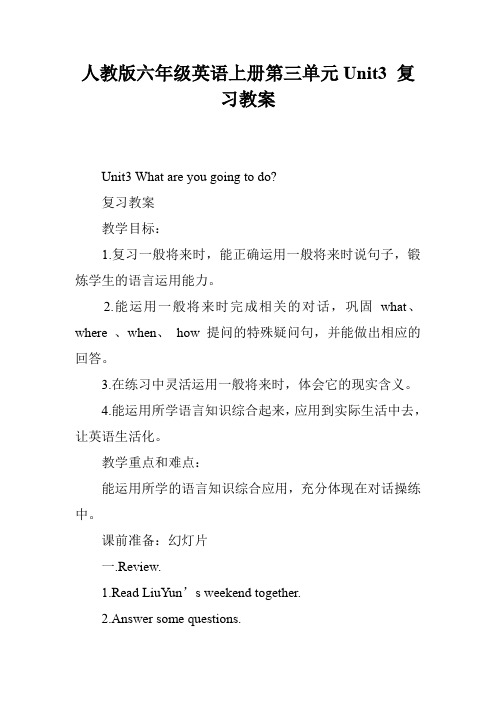
人教版六年级英语上册第三单元Unit3 复习教案Unit3 What are you going to do?复习教案教学目标:1.复习一般将来时,能正确运用一般将来时说句子,锻炼学生的语言运用能力。
2.能运用一般将来时完成相关的对话,巩固what、where 、when、how 提问的特殊疑问句,并能做出相应的回答。
3.在练习中灵活运用一般将来时,体会它的现实含义。
4.能运用所学语言知识综合起来,应用到实际生活中去,让英语生活化。
教学重点和难点:能运用所学的语言知识综合应用,充分体现在对话操练中。
课前准备:幻灯片一.Review.1.Read LiuYun’s weekend together.2.Answer some questions.1).Is Liu Yun going to the shoe store by subway on Saturday?2).What is Liu Yun going to buy ?3).Where is Liu Yun going with her mother on Sunday?4).Is Liu Yun going to have a happy weekend?3.T: Well done. Liu Yun is going to have a happy and busy weekend. How are you going to have this weekend? I want to know. Can you tell me?SS:Yes. (提问部分学生回答)二.Presentation:1.T: Great! Everybody is going to have a happy or busy weekend. But I’m going to have a happy weekend, too. I’m going to Dongguan. (出示幻灯片) I’m going to buy many things. I’m going by car. I’m going at 3 o’clock. I can’t wait.2.T: In Dongguan, there are so many stores and so many goods. Look here, what shop is it?(出示地方图片)S: It’s a bookstore.T: In the bookstore, what can you buy?S: I can buy -------.3.T:In difference shop we can buy difference things. Is that right? We are very happy when we go shopping. Yes??4.T make a dialogue with students.A: Hello! Where are you going this evening?B:A: What are you going to buy?B:---------------------------A: When are you going?B: --------------------------A: How are you going?B:---------------------------A: Thank you.B:----------------------------5.T: Your plan is wonderful! We can use these words to ask your parner.(板书:where→ what →when→ how)三.Consolidation and extension:e these tips to make a dialogue with your parner.Student1:A)Where are you going this afternoon? Student2:A)I’m going to the bookstrore.B)I’m going to go hiking.A)Great.B)What are you going to buy? A)I’m going to buy a story.B)I go to the cinema.c)I’m watching TV.Student1:A)Where are you going this afternoon?B)What are you going to buy? Student2:A)I’m going to buy some fruits.B)I go to the supermarket with my mother.c)I’m going to the fruit stand.What about you?A)I’m going to the cinema .B)Where is the fruit stand?C)Is it far from here?D)Thank you. A)You’re welcome.B)It’s near the post office.C)Great.D)No, it’s not far.Student1:A)Where are you going this afternoon? Student2:A)I’m going to the shoe store.B)Yes, I’m going to the theme park.A)Can I go with you ?B)When are you going ?C)Ok .See you then .D)What are you going to do ? A)Sure .C)I’m going to buy a pair of shoes .D)See you .B)I’m going at 5:30.A)Where is the shoe store ?B)Is it far from here ?C)How are you going there ?D)Can you go on foot ? A)Sure ,it’s good exercise .B)It’s north of the library .C)I’m going by bike .D)Yes ,it’s far .E) No, it’s not far .四.听录音,判断句子对错:1.Mike is going to visit his grandparents this weekend.()2.John’s grandparents live in a beautiful city.()3.Ann is John’s cousin.()4.John and Ann are going to help their grandparents do homework.(5.Ann and John are very helpful.()五.Writing:根据所给的图片,展开合理的想象,写出你星期日下午打算去哪?怎样去?跟谁去?去干什么?六.Homework: Use these tips to write a dialogue.教学反思:这节课主要复习一般将来时,整个教学过程是围绕this weekend展开,从一开始复习LiuYun’s weekend, 到回答问题,主要让学生回忆起一般将来时,然后出示地方图片,会用What can you buy in the---?提问,为下英语。
人教版初三第一轮复习八年级上册Unit 3 复习教学案(无答案)

_________学校 8 年级上册英语Units 3 复习教学案总第课时The first class on CCTV—1 continued throughout September 1,2008.The program was made by CCTV and Ministry of Education. It had been students' constant companion for the last six years. The new topic performed this term is “Parents taught me”.In this class,not only children but also parents became the focus. Parents taught us by using their personal examples which benefited us a lot. In my opinion,both family education and school education play a very important role. The children are affected by their parents during their growth. Every word and action of the parents,will affect the children. As parents,they must give the children a good environment for their growth,must be strict selfdiscipline,set a good example to their children. Teach children to correctly judge things,guide the children to grow healthily. Now every family generally have a child,the child's childhood education is every parents' responsibility,after all parents are the first teachers of the children. For the healthy growth of children,hope all parents can set up the correct words and deeds,for children to make them proud. Of course,children should give courage,compassion(怜悯) and dedication(奉献) in return. ()1.The program The first class on CCTV—1 started in ________.A.2008B.2014C.2010()2.What's the topic of 2014 first class?A.School education.B.Students' constant companion.C.Parents taught me.()3.________ entered the class and played a very important role.A.Teachers and studentsB.Doctors and patientsC.Parents and children()4.The underlined word “judge” means ______.A.判断B.考虑C.解决()5.According to the passage,the writer mainly tells us ________.A.The first class on CCTV—1 continued throughout September 1,2008.B.Family education plays a very important role.C.The children are affected by their parents during their growth.Step 7. 课后作业《随堂同步训练》P 159必做:五、完型填空;八、书面表达。
2020届一轮复习人教版必修三Unit3学案设计(37页word版)
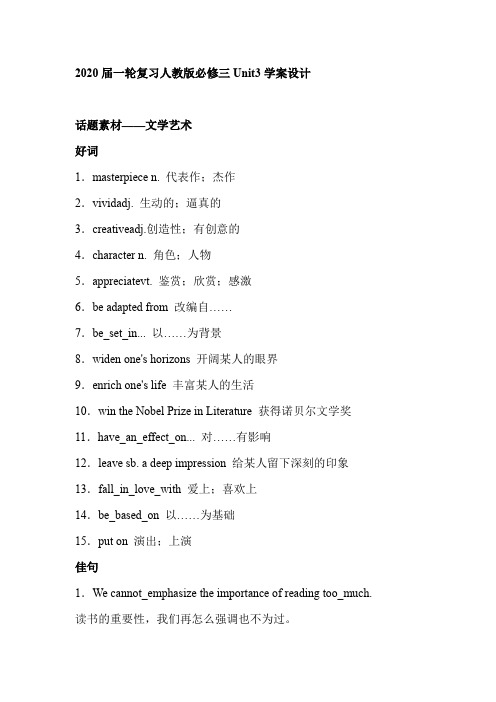
2020届一轮复习人教版必修三Unit3学案设计话题素材——文学艺术好词1.masterpiece n. 代表作;杰作2.vividadj. 生动的;逼真的3.creativeadj.创造性;有创意的4.character n. 角色;人物5.appreciatevt. 鉴赏;欣赏;感激6.be adapted from 改编自……7.be_set_in... 以……为背景8.widen one's horizons 开阔某人的眼界9.enrich one's life 丰富某人的生活10.win the Nobel Prize in Literature 获得诺贝尔文学奖11.have_an_effect_on... 对……有影响12.leave sb. a deep impression 给某人留下深刻的印象13.fall_in_love_with 爱上;喜欢上14.be_based_on 以……为基础15.put on 演出;上演佳句1.We cannot_emphasize the importance of reading too_much. 读书的重要性,我们再怎么强调也不为过。
2.Some classic works not_only offer us joy and excitement, but_also encourage us to think critically.一些经典作品不但让我们喜悦和兴奋,而且鼓励我们批判性地思考。
3.Only when I went to senior high school did_I_become_interested_in_literature.直到上了高中,我才对文学产生兴趣。
[精美语篇]I Like ReadingReading is my favourite hobby. I can never stop the love for reading because books are like wise teachers as well as good friends in my life. As we know, books are the source of knowledge. I benefit a great deal from reading. There are a variety of books for us to choose from, like history books, science books, literary books and so on. But what interests me most are literary books, especially those by famous writers. For one thing, they help to improve my writing skills and broaden my horizons. For another, they can enrich my life and provide me with great fun. Isn't it a pleasure to have great calm in mind while you are reading?高频单词1.ahead (adv.) 在前;向前;提前2.stare (vi.) 凝视;盯着看3.fault (n.) 过错;缺点;故障4.spot (vt.) 发现;认出;(n.) 斑点;污点;地点→spotted (过去式/过去分词)5.passage (n.) 船费;通道;(一)段6.account (vi.&vt.) 认为;说明;总计有;(n.) 说明;理由;计算;账目7.phrase (n.) 短语;词组;惯用语8.wander (vi.) 漫游;漫步;漂泊9.seek (vt.&vi.) 寻找;探索;寻求→sought (过去式/过去分词) 10.contrary (n.) 反面;对立面;(adj.) 相反的;相违的11.amount (n.) 数量12.indeed (adv.) 真正地;确实;实在13.birthplace (n.) 出生地;故乡→birthday (n.) 生日14.novel (n.) 小说;长篇故事;(adj.) 新奇的;异常的→novelist (n.) 小说家15.adventure (n.) 奇遇;冒险→adventurous (adj.) 冒险的16.scene (n.)(戏剧)一场;现场;景色→scenery (n.) 景色17.permit (vt.&vi.) 许可;允许;准许;(n.) 通行证;许可证;执照→permission (n.) 允许;许可→permitted (过去式/过去分词) 18.patience (n.) 耐性;忍耐→patient (adj.) 耐心的;有耐性的→patiently (adv.) 有耐心地19.believe (vt.) 相信;信任→belief (n.) 信念;信仰→unbelievable (adj.) 难以置信的→believable(adj.) 令人相信的20.rude (adj.) 粗鲁的;无礼的→rudeness (n.) 粗鲁;无礼21.manner (n.) 举止;方式→manners (n.) 礼貌;规矩重点短语1.bring_up 抚养;培养;教育;提出2.go_ahead 前进;(用于祈使句)可以;往下说3.stare_at 盯着看;凝视4.account_for 是……的原因;解释5.on_the_contrary 与此相反;正相反6.by_accident 偶然;无意中;不小心7.take_a_chance 冒险8.in_rags 衣衫褴褛9.as_for 关于;至于10.to_be_honest 说实话热点句型1.find+宾语+宾语补足语Well, towards nightfall I found_myself_carried_out_to_sea (发觉自己被刮到海里去了) by a strongwind.(教材P18)2.had just done...when... 刚做完……,这时……The next morning I'd_just_about_given_myself_up ( 我正感到绝望的时候) for lost when_I_was_spotted_by_a_ship (这时一艘船发现了我). (教材P18)3.强调句型:It+be+被强调部分+that...And it_was_the_ship_that (正是那艘船) brought you to England. (教材P18)4.主语从句:It is well-known that... 众所周知,it 作形式主语,后面的that 从句作真正的主语Well,_it_is_well-known_that (众所周知) Americans like to eat a lot. (教材P22)5.whenever=no matter when,引导让步状语从句Indeed, sir, I hope you'll come here whenever_you_like (您想来的时候就来). (教材P22)巩固训练在空白处填入适当的内容(1 个单词)或括号内单词的正确形式。
中考英语一轮复习人教八下Unit3 复习 课程教学设计

八下U3复习教学设计一、教材分析本单元的话题是做家务,主要是关于家庭生活,谈论家庭琐事及家庭互助。
要求学生学会用“Could you please...?”和“Could I please...?”来委婉的提出请求或征求别人的许可,以及如何有礼貌的拒绝别人并表达自己的理由。
家庭生活及家务劳动是社会家庭和学生生活中的重要方面,对学生生活习惯的养成、社会行为习惯及家庭责任感的建立起着重要作。
通过本单元的学习,学生应对参加及帮助父母做适当的家务持有积极的态度。
此外,学生还将了解中西方在这方面的文化差异,增强他们在日常生活中的沟通和交流能力。
本节课的具体设计如下:1.对基础单词的复习,掌握重点单词以及短语,为接下来知识点的复习奠定知识基础。
2.以课本编排为线索,讲解课文中出现的重要句式。
讲解过程中进一步复习语法点,拓展相关知识,结合课本基础知识与课文,改变题目,直击考点,与中考题型接轨。
3.以《中考档案》为依据,对高频考点进一步讲解,辨析难点、混淆点,并以图表、例题来进一步巩固练习。
4当堂训练部分,让在练习中进一步巩固基础知识,夯实基础。
5.作业部分让学生完成与本节课相关的单选题和阅读题。
通过阅读来提高学生的做题技巧,提高学生对知识的综合运用能力。
二、学情分析九年级的学生在中考复习中已经具备了一定的知识基础,如何将八年级的知识与初中所学英语知识相连接,形成完整的知识体系,更好的做好基础知识储备,为中考英语基础题目部分奠定基础是复习的一个重要目的。
此外,大部分九年级学生由于平时忽视且缺乏阅读能力的训练,缺乏相关的阅读技巧和策略,在平时的考试中失分严重。
因此,通过将课本重点链接中考题型,尤其是中考新题型,让学生更好的掌握阅读题做题方法与技巧,提升阅读能力,学会分析问题、理解问题进而解决问题是复习的又一重要目的。
三、教学目标(一)语言目标掌握与家务劳动有关的词汇,及如能够谈论对做家务的看法。
(二)能力目标1.通过复习基础知识,夯实基础:能写出重点单词和重点句型,同时掌握复习链接的相关拓展知识,增加知识储备。
- 1、下载文档前请自行甄别文档内容的完整性,平台不提供额外的编辑、内容补充、找答案等附加服务。
- 2、"仅部分预览"的文档,不可在线预览部分如存在完整性等问题,可反馈申请退款(可完整预览的文档不适用该条件!)。
- 3、如文档侵犯您的权益,请联系客服反馈,我们会尽快为您处理(人工客服工作时间:9:00-18:30)。
Unit 3 lesson3-4导学案学习目标:1. 掌握本课重要单词、短语的用法,识记拓展及造句。
2. 学会分析句式,会仿写并能灵活地运用在作文中。
Step I. 单词听写;Step II. 完成“三维设计P14-16”单词和短语的拓展练习;Step III. 查找书及资料书完成下列短语及其拓展。
1.收到婚礼请柬______________2.婚礼庆典的时间______________3.婚宴的入口处______________4.捐献一大笔钱______________5.为...做贡献______________6.出席会议/仪式______________7.与...相连接______________8. ...的象征______________9.即使______________ 10.似乎,好像______________ 11.在...的前面______________ 12.张贴,悬挂______________ 13.尽可能地______________ 14.也,还______________15.一片混乱______________ 16.保持清醒______________17.高兴地唱着圣诞颂歌______________ 18.继续做...______________19.一...就...______________ 20.进入甜美的梦乡______________ Step IV. 默写(请合上课本写出下列句子)1.假如你的朋友收到婚礼请柬,即使你没收到,也可以跟他(她)一起去。
_______________________________________________________________________________ 2.在教堂婚礼上,伴郎要帮助牧师把花冠戴在新郎、新娘头上。
连接花冠的长长丝带,代表一对新人幸福长久的生活。
_______________________________________________________________________________ _______________________________________________________________________________ 3.婚礼结束后,客人可以参加婚宴。
婚宴的规模通常很大,持续通宵。
_______________________________________________________________________________ _______________________________________________________________________________ 4.宴会上提供各种各样的食品、饮料,还有舞会,其中包括著名的希腊圆圈舞,人人都会加入其中。
_______________________________________________________________________________ _______________________________________________________________________________ 5.在我的记忆中,圣诞节总是从寒冷多风的十一月中旬就开始了。
姐姐艾莉森和我坐在火炉前,给圣诞老人写信,告诉他我们想要的礼物。
_______________________________________________________________________________ _______________________________________________________________________________ 6.圣诞节前夕,家人都来装饰房屋,竖起圣诞树,挂上各种装饰和气球。
_______________________________________________________________________________ Task⑴:请和你的同桌互相分析其中各句所包含的知识点和语法现象。
Task⑵:请仿照翻译下列句子。
1.即使他能听懂你的话,他也不会听从你的建议。
_______________________________________________________________________________ 2.作为一名高三学生,他几乎没有空闲时间去培养自己的爱好。
_______________________________________________________________________________ 3.在大多数情况下,大学毕业生不在乎他们将做什么工作,只要是一份能挣钱养活自己的工作就行。
_______________________________________________________________________________ 4.几年过去了,她在许多地方工作过,情况总是不断改善,而且还逐渐获得了越来越多的经验。
_______________________________________________________________________________ Step V. 回归课本,夯实基础。
Task1. 完成下列短文改错。
(10处)On the day of a Greek Wedding ceremony, the bridegroom have to ask the bride’s father for his daughter’s hand in marriage. The bridegroom’s best man then goes with the couple to church, to be married.During the church ceremony, the best man should to help put crowns made of flowers on the heads of the bride and bridegroom. A long silk ribbon that link the crowns is a symbol of a long and happily life for the couple.Before the ceremony, the guests can attend a wedding reception, where is usually a huge party and can last through the night. There is a lot of eating, drinking and dancing, include the famous Greek circle dance, which everyone joins in. During the reception, guests can throw dishes in the floor and put money on the bride’s wedding dress for good luck.Task 2. 完成下列语法填词。
For me, Christmas always began in the middle of the cold, 1_______ (wind) month of November. My sister, Alison, and I sat down in front of the fire 2_______ wrote a letter 3_______ Father Christmas 4_________ (tell) him about all the presents 5_______________ we wanted. We seriously wrote “Father Christmas, the North Pole” on the envelope, 6________ giving them to our mother to post. 7________ December our excitement grew each day—as we opened the new calendar, Christmas cards arrived in the post, Christmas lights appeared in the streets, and we 8___________ (attend) the town carol service. And of course, there was snow 9____________. Enough snow to make snowmen, and to have 10_________ (excite) snowball fights in the school playground.Step VI. 直击高考1.(2015,天津)The boss of the company is trying to create an easy atmosphere_______ his employees enjoy their work.2.(2015, 福建)China Today attracts a worldwide relationship,_______ shows that more and more people all over the world want to learn about China.3.(2015, 陕西)As the smallest child of his family, Alex is always longing for the time ________ he should be able to be independent.4.(2015, 湖南)When the clerk saw a kind face wrinkled in an apologetic smile, she stood rooted to the ground,__________(wonder) whether to stay or leave.5.(2015,重庆)Like ancient sailors, birds can find their way_________(use) the sun and the stars. Step VII. 综合运用------结合本单元句型,并运用部分重要词组,如marry sb, invite sb to do sth, attend wedding ceremony, including/included, with +o. +o.c., blow up, give up, come to understand等,用五句话表达我朋友以下的经历:Maggie是我一位最要好的朋友,她去年嫁给了一个非常富裕的日本人,并邀请了高中的同班同学,包括我们的班主任,参加了她在白天鹅酒店举行的婚礼。
